I’ve read over eighty books this year, so cutting it down to my Top Ten favourite ones has been difficult. But from number 10 to number 1, here are the best books I have read in 2017. I’ve included a picture and the price on Amazon in case you would like to buy the books.
Tell us what your Top Ten books are this year in the comments section!
- Edmund Burke: The Visionary Who Invented Modern Politics – Jesse Norman (£9.99)
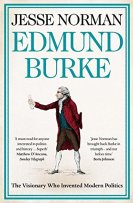 A wonderful introduction to the life and thought of the great 18th Century philosopher and politician Edmund Burke. The thinking of Burke has had a massive impact upon both conservative and liberal traditions in Anglo-American politics, but he has often been dismissed as a reactionary. Jesse Norman proves this is not the case. Instead, Burke is portrayed as a very human figure, whose thinking is always rooted in his context. His very ‘common sense’ approach to politics – including developing political parties, the politician as representative of the people (not voice of the people), an emphasis on continuity and gradual change – are quite inspiring. The book is very easy to read, and even something of a page turner!
A wonderful introduction to the life and thought of the great 18th Century philosopher and politician Edmund Burke. The thinking of Burke has had a massive impact upon both conservative and liberal traditions in Anglo-American politics, but he has often been dismissed as a reactionary. Jesse Norman proves this is not the case. Instead, Burke is portrayed as a very human figure, whose thinking is always rooted in his context. His very ‘common sense’ approach to politics – including developing political parties, the politician as representative of the people (not voice of the people), an emphasis on continuity and gradual change – are quite inspiring. The book is very easy to read, and even something of a page turner!
- The Giving Gift: The Holy Spirit in Person – Tom Smail (£19.00)
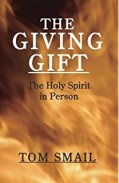 I have enjoyed reading the works of Tom Smail ever since I encountered his Like Father, Like Son, a book on the Trinity. His book The Giving Gift is a theology of the Holy Spirit from a charismatic Anglican perspective. Smail emphasises that the nature of the Spirit is ‘gift’, which impacts on the very way we conceive the Trinitarian relations. Drawing on theologians such as Thomas Torrance, Karl Barth, as well as the Eastern Orthodox tradition, Smail creates a very readable and – more importantly – a deeply prayerful book, rooted in the gift of the Spirit.
I have enjoyed reading the works of Tom Smail ever since I encountered his Like Father, Like Son, a book on the Trinity. His book The Giving Gift is a theology of the Holy Spirit from a charismatic Anglican perspective. Smail emphasises that the nature of the Spirit is ‘gift’, which impacts on the very way we conceive the Trinitarian relations. Drawing on theologians such as Thomas Torrance, Karl Barth, as well as the Eastern Orthodox tradition, Smail creates a very readable and – more importantly – a deeply prayerful book, rooted in the gift of the Spirit.
- Institutes of the Christian Religion – John Calvin (£21.24)
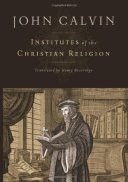 It’s taken several years, but I’ve finally managed to finish read John Calvin’s great Institutes. What makes this work still powerful is its very simplicity. Originally written more as an introduction to the Christian faith, the work gradually grew through several traditions to become something of a systematic theology. Several areas speak out: his writing on the Trinity is always a masterful introduction; his thinking on the Ten Commandments and Lord’s Prayer are quiet and often overlooked gems; his work on the mediating role of Christ was profound. I’m glad to have read it.
It’s taken several years, but I’ve finally managed to finish read John Calvin’s great Institutes. What makes this work still powerful is its very simplicity. Originally written more as an introduction to the Christian faith, the work gradually grew through several traditions to become something of a systematic theology. Several areas speak out: his writing on the Trinity is always a masterful introduction; his thinking on the Ten Commandments and Lord’s Prayer are quiet and often overlooked gems; his work on the mediating role of Christ was profound. I’m glad to have read it.
- Baptized in the Spirit: A Global Pentecostal Theology – Frank Macchia (£18.99)
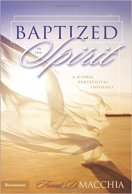 We see in theologians like Frank Macchia that Pentecostal theology has ‘come of age’. As in his other work, Justified in the Spirit, here Macchia emphasises that Pentecostal piety and belief has a great part to play in the global theological conversation. Taking the Pentecostal emphasis on ‘baptism in the Spirit’, Macchia uses this as a metaphor which engages on several aspects of the traditional loci of systematic theology, including the Trinity, the Kingdom, justification, sanctification, ecclesiology, pluralism, and the sacraments. Deeply ecumenical – engaging with Protestant, Catholic and Orthodox writers – it is well worth reading.
We see in theologians like Frank Macchia that Pentecostal theology has ‘come of age’. As in his other work, Justified in the Spirit, here Macchia emphasises that Pentecostal piety and belief has a great part to play in the global theological conversation. Taking the Pentecostal emphasis on ‘baptism in the Spirit’, Macchia uses this as a metaphor which engages on several aspects of the traditional loci of systematic theology, including the Trinity, the Kingdom, justification, sanctification, ecclesiology, pluralism, and the sacraments. Deeply ecumenical – engaging with Protestant, Catholic and Orthodox writers – it is well worth reading.
- Baptism: Its Purpose, Practice and Power – Michael Green (£6.99)
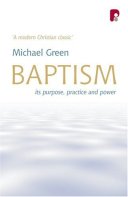 Probably the best introduction to baptism in the Evangelical Anglican tradition I have come across. Green simply but carefully introduces the reader to the nature of baptism as a covenant act, the biblical basis of infant baptism, the post-baptismal life (including the question of baptism in the Spirit), as well as offering some friendly critique of the Church of England’s practice of indiscriminate baptism. The sheer lucidity of writing when engaging with this difficult and complex subject matter is striking, and I would happily recommend this to any seminary or theological college who may want to introduce their students to the Evangelical Anglican understanding of baptism.
Probably the best introduction to baptism in the Evangelical Anglican tradition I have come across. Green simply but carefully introduces the reader to the nature of baptism as a covenant act, the biblical basis of infant baptism, the post-baptismal life (including the question of baptism in the Spirit), as well as offering some friendly critique of the Church of England’s practice of indiscriminate baptism. The sheer lucidity of writing when engaging with this difficult and complex subject matter is striking, and I would happily recommend this to any seminary or theological college who may want to introduce their students to the Evangelical Anglican understanding of baptism.
- The God of Small Things – Arundhati Roy (£6.29)
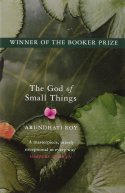 Published over twenty years ago, the Booker Prize winning novel The God of Small Things still packs a punch. It is the story of two twins, Rahel and Esthappen, whose young lives have been decimated by events outside of their control. Set in south India, we see how the interaction of the caste system, political tensions, and the passions of love can decimate. The lush language seems to grow out of the very green land of Kerala in which the novel is set, and each character is permanently imprinted on my mind. Hauntingly unforgettable.
Published over twenty years ago, the Booker Prize winning novel The God of Small Things still packs a punch. It is the story of two twins, Rahel and Esthappen, whose young lives have been decimated by events outside of their control. Set in south India, we see how the interaction of the caste system, political tensions, and the passions of love can decimate. The lush language seems to grow out of the very green land of Kerala in which the novel is set, and each character is permanently imprinted on my mind. Hauntingly unforgettable.
- Evangelical Calvinism: Essays Resourcing the Continuing Reformation of the Church – Myk Habets and Bobby Grow (£39.00)
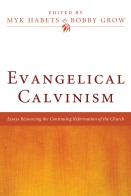 The 19th and 20th Centuries saw something of a revival of the Reformed tradition, one which looked past ‘Calvinism’ and back to ‘Calvin’. We see this in such thinkers as MacLeod Campbell, Forsyth, Barth, Torrance and Gunton. The collection of essays in Evangelical Calvinism seek to develop upon this new tradition. Reacting against the so-called and well-known ‘Federal Calvinism’ which developed in the 17th Century (the kind that emphasises such things as ‘double predestination’), these thinkers seek to emphasise such aspects as the incarnation of Christ, election centred upon him, as well as our union with him. I’m looking forward to getting my hands on the recently published second volume!
The 19th and 20th Centuries saw something of a revival of the Reformed tradition, one which looked past ‘Calvinism’ and back to ‘Calvin’. We see this in such thinkers as MacLeod Campbell, Forsyth, Barth, Torrance and Gunton. The collection of essays in Evangelical Calvinism seek to develop upon this new tradition. Reacting against the so-called and well-known ‘Federal Calvinism’ which developed in the 17th Century (the kind that emphasises such things as ‘double predestination’), these thinkers seek to emphasise such aspects as the incarnation of Christ, election centred upon him, as well as our union with him. I’m looking forward to getting my hands on the recently published second volume!
- The Cross of Christ – John Stott (£11.59)
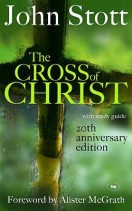 The Cross of Christ is John Stott’s magnum opus, and what will probably be his greatest contribution to popular theology. At its centre is the emphasis on penal substitutionary atonement, a theme which he masterfully yet simply exposits. But to reduce the work to that theme alone would not do justice to this rich and multifaceted book. Stott looks at the impact on the Cross on so many areas, from our piety, to our church-life together, to Christian ethics. At once a mystery and an event to be understood, Stott’s vision of the Cross is a tree whose branches stretch out further and further into the sky, yet at once deeply connected to the trunk which passionately affirms that in the Cross, Christ died for our sins.
The Cross of Christ is John Stott’s magnum opus, and what will probably be his greatest contribution to popular theology. At its centre is the emphasis on penal substitutionary atonement, a theme which he masterfully yet simply exposits. But to reduce the work to that theme alone would not do justice to this rich and multifaceted book. Stott looks at the impact on the Cross on so many areas, from our piety, to our church-life together, to Christian ethics. At once a mystery and an event to be understood, Stott’s vision of the Cross is a tree whose branches stretch out further and further into the sky, yet at once deeply connected to the trunk which passionately affirms that in the Cross, Christ died for our sins.
- Atonement: The Person and Work of Christ – Thomas Torrance (£28.71)
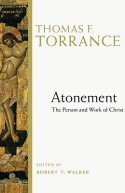 The follow-up to his lecture series on the Incarnation, Torrance’s work on the atonement is nothing short of a masterpiece. It is said of Thomas Aquinas that he answers questions you never thought to ask, and one can say the same for Atonement. Each chapter looks at the Hebrew and Greek words which help us understand the nature of atonement, before from there richly interacting with the Scriptures, the Fathers, and the Reformers. Extending the atonement from the Cross to include the Resurrection, the Ascension, the sacraments and the Second Coming, Torrance’s grasp of theological discussion is breath-taking.
The follow-up to his lecture series on the Incarnation, Torrance’s work on the atonement is nothing short of a masterpiece. It is said of Thomas Aquinas that he answers questions you never thought to ask, and one can say the same for Atonement. Each chapter looks at the Hebrew and Greek words which help us understand the nature of atonement, before from there richly interacting with the Scriptures, the Fathers, and the Reformers. Extending the atonement from the Cross to include the Resurrection, the Ascension, the sacraments and the Second Coming, Torrance’s grasp of theological discussion is breath-taking.
- Anti-Arminians: The Anglican Reformed Tradition from Charles II to George I – Stephen Hampton (£112.50)
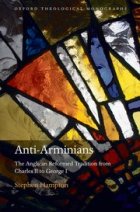 This one has been a late surprise for me, but has shot straight to the top of the list. According to many historians of Anglicanism, after the return of Charles II to the throne in 1662 (the ‘Restoration’), the ‘Reformed’ tradition in the Church of England was essentially dead. The outcome of this is that many could argue that to be Anglican is really to be ‘High Church’ or ‘Liberal’, and that the Evangelical tradition is an unwanted and unnatural growth. Stephen Hampton essentially decimates this reading of history in his book Anti-Arminians, which is the story of the Anglican Reformed tradition from the Restoration to the early-Georgian era. The book convincingly demonstrates that not only did the Anglican Reformed tradition survive the Restoration, it thrived in that period, and only towards the mid 18th Century did it loose its edge (to be revived once more by Evangelicalism). What is most surprising is the theological engagement between the Reformed tradition and Medieval thinkers such as Thomas Aquinas, as well as 17th Century Roman Catholic writers, an engagement used to fight the theological innovations of the High Church Arminians. This is an expensive book, but if you are interested in this bit of history, I cannot recommend it more highly.
This one has been a late surprise for me, but has shot straight to the top of the list. According to many historians of Anglicanism, after the return of Charles II to the throne in 1662 (the ‘Restoration’), the ‘Reformed’ tradition in the Church of England was essentially dead. The outcome of this is that many could argue that to be Anglican is really to be ‘High Church’ or ‘Liberal’, and that the Evangelical tradition is an unwanted and unnatural growth. Stephen Hampton essentially decimates this reading of history in his book Anti-Arminians, which is the story of the Anglican Reformed tradition from the Restoration to the early-Georgian era. The book convincingly demonstrates that not only did the Anglican Reformed tradition survive the Restoration, it thrived in that period, and only towards the mid 18th Century did it loose its edge (to be revived once more by Evangelicalism). What is most surprising is the theological engagement between the Reformed tradition and Medieval thinkers such as Thomas Aquinas, as well as 17th Century Roman Catholic writers, an engagement used to fight the theological innovations of the High Church Arminians. This is an expensive book, but if you are interested in this bit of history, I cannot recommend it more highly.
Here are the top thirty books I’ve read this year:
30. The Widening Circle: Priesthood as God’s Way of Blessing the World – Graham Tomlin
29. The Spirit of Worship: The Liturgical Tradition – Susan J. White
28. The Go-Between God: The Holy Spirit and the Christian Mission – John V. Taylor
27. Jubilate: Theology in Praise – Daniel Hardy and David Ford
26. Evangelical Truth: A Personal Plea for Unity, Integrity, and Faithfulness – John Stott
25. 1 & 2 Peter – Douglas Harink
24. The Zimzum of Love – Rob and Kristen Bell
23. Sleepwalking Land – Mia Couto
22. Holding Together: Gospel, Church and Spirit – Christopher Cocksworth
21. Covenant of Grace Renewed: A Vision of the Eucharist in the 17th Century – Kenneth Stevenson
20. Lord and Servant: A Covenant Christology – Michael Horton
19. The Living Church: Convictions of a Lifelong Pastor – John Stott
18. The Book of Secrets – M.G. Vassanji
17. ‘Fundamentalism’ and the Word of God – J.I. Packer
16. An Altar in the World: Finding the Sacred Beneath Our Feet – Barbara Brown Taylor
15. Christ the Key – Kathryn Tanner
14. The Pastor as Public Theologian: Reclaiming a Lost Vision – Kevin Vanhoozer and Owen Strachan
13. The Experience of God: Being, Consciousness, Bliss – David Bentley Hart
12. Us – David Nicholls
11. Christianity Rediscovered – Vincent J. Donovan
10. Edmund Burke: The Visionary Who Invented Modern Politics – Jesse Norman
9. The Giving Gift: The Holy Spirit in Person – Tom Smail
8. Institutes of the Christian Religion – John Calvin
7. Baptized in the Spirit: A Global Pentecostal Theology – Frank Macchia
6. Baptism: Its Purpose, Practice and Power – Michael Green
5. The God of Small Things – Arundhati Roy
4. Evangelical Calvinism: Essays Resourcing the Continuing Reformation of the Church – Myk Habets and Bobby Grow
3. The Cross of Christ – John Stott
2. Atonement: The Person and Work of Christ – Thomas Torrance
1. Anti-Arminians: The Anglican Reformed Tradition from Charles II to George I – Stephen Hampton